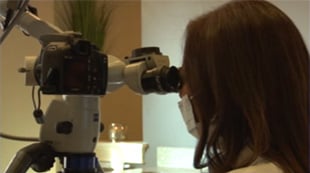Endodontic FAQ

What is an Endodontist
An endodontist is a licensed dentist that has completed two or more years of advanced post-doctoral residency training in the specialty of endodontics. All dentists are trained to provide endodontic treatment, but many will refer their patients to endodontists.
Endodontists provide only endodontic services because they are specialists. They perform routine as well as difficult and complex endodontic procedures including retreatments and surgical treatments. Endodontists are also experienced in finding the cause of oral and facial pain that is difficult to diagnose.
What is a Root Canal
Root canal treatment removes the diseased inner pulp tissue of a tooth in order to stop painful inflammation and to prevent a dental abscess. "Endo" is the Greek word for inside, and "don't" is Greek for tooth. Without endodontic treatment, diseased teeth would need to be extracted. Root canal treatment stops the disease process and prevents infection so that the tooth can continue to provide function throughout life.
I'm Worried about x-rays. Should I be?
No. While x-rays will be necessary during your Endodontic treatment, we use an advanced technology to maximize useful x-rays and reduce radiation levels. Non-film computerized digital images deliver up to 25% less radiation than a standard generator to help ensure the safety of patients and staff. These digital images can be optimized, archived, printed and sent to your dentist via e-mail, or diskette.
What about infection?
In most cases, antibiotics are not required after endodontic therapy. You will be given a prescription for antibiotics if we feel it is necessary. Your dentist may have placed you on an antibiotic prior to your appointment. We will let you know if you should continue this. Some medical conditions, such as hip joint replacements, require special doses of antibiotics an hour before treatment to reduce the risk of infection of the joint. If you have been told by your physician to pre-medicate with an antibiotic for dental treatment, make sure to fill your antibiotic prescription before your appointment date and take the antibiotic as it is prescribed. This special pre-medication dose is still needed even if you have been taking a daily regime of antibiotics for several days already. If you have any questions about this, please call our office.

Will the procedure be painful?
The majority of root canals are treated without any discomfort to the patient. Endodontists are specialists trained in a variety of local anesthetic techniques. Many times the “nerve” of the tooth is “dead” and does not even require anesthetic for the work to proceed. Your dentist may have determined that you need a root canal even though you are not having any symptoms. This is the best time to have a root canal done. Left untreated, the condition can progress to a painful toothache, an abscess or cause additional structural damage to the underlying bone.
How many appointments will it take?
Many root canals can be treated in one visit, but the number of visits required may be dictated by the presence of infection or other complications. Root canal retreatments often require two visits. Most appointments are from 60 to 90 minutes.
Will I be able to drive home or go to work after the appointment?
In most cases, you should consider this appointment no more involved than a routine dental filling. Unless we prescribe anti-anxiety medications to take during the appointment, or you have been taking narcotic pain mediations, then you should be able to drive yourself to and from the appointment. If you felt well enough to work prior to your appointment, then you should feel well enough to return to work afterwards.
How should I take care of my tooth after the appointment?
If we placed a temporary filling, avoid drinking hot beverages or chewing on the tooth for several hours until it has had time to harden. To avoid cracking the tooth, it is best to avoid heavy chewing until you have the permanent crown placed. Temporary restorations cannot be expected to last for more than 30 days. Failure to return to your dentist for the final restoration could result in recontamination or fracture of the tooth, which could ultimately result in loss of the tooth. Please make sure you understand what type of restoration was placed in your tooth at the time of root canal treatment, and whether you need to contact your dentist for further restoration.
What happens after treatment?
Through our unique relationship with your dentist, we are able to collaborate in sharing your radiographs. Thus, when your root canal therapy has been completed, a digital record of your treatment will be forwarded to your restorative dentist. Additionally, you should contact your general dentist for a follow-up restoration within a few weeks of completion at our office. Your dentist will decide on what type of restoration is necessary to protect your tooth. It is rare for endodontic patients to experience complications after routine endodontic treatment or microsurgery. If a problem does occur, however, we are available at all times to respond to your needs.

What new technologies are being used?
In addition to digital radiography, we utilize special operating microscopes. Magnification and fiber optic illumination are helpful in aiding the doctor to visualize tiny details inside your tooth. Diagnosis has become more accurate with the microscope aiding in detecting cracks in teeth. Also, a tiny video camera on the operating microscope or high-resolution camera can record images of your tooth to help further document the doctor's finding for enhanced communication.
